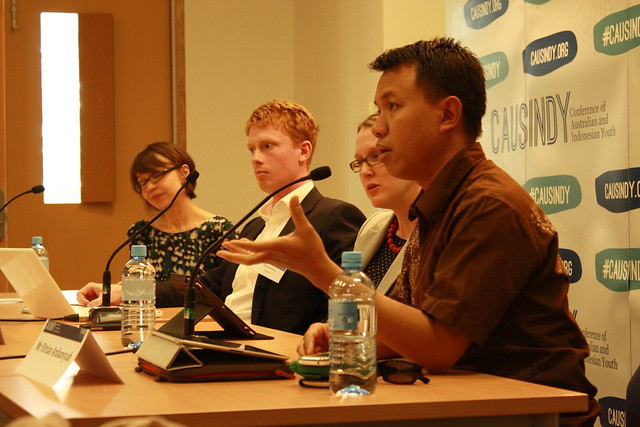Q&A with Fitrian Ardiansyah, Climate and Sustainability Specialist
Fitrian Ardiansyah is a climate and sustainability specialist, with over sixteen years’ experience in the fields of natural resource management, climate change, energy and sustainability. He is currently finalising his doctoral research at the Crawford School of Public Policy at the Australian National University in Canberra, and is also the Program Development Director for Pelangi Indonesia and Fellow at the International League of Conservation Writers.

Fitrian speaking at CAUSINDY last year.
We spoke to him about his research background and experience studying in Australia.
Tell us a little about your background — what did you study, and where did you begin your career after you graduated?
Well, my interest in and passion for the environment go back to my high school time. I was born and brought up in Jakarta, a megapolitan and capital city in Indonesia. I was fortunate to study at a well-respected public senior high school in Jakarta (SMA Negeri 8). This school was, however, situated in a flood plain area. Hence, whenever a rainy season came, we experienced annual flooding. The frequent occurrence of flooding made me realised that even living in a big city like Jakarta we have been reminded all the time about critical environmental challenges we were facing as a society. With an increase in my level of understanding on urban environmental challenges, I then began to try to grasp a bigger issue – as a developing country accelerates its economic growth, unwanted consequences such as environmental degradation have become prevalent and, therefore, something needs to be done to find balanced solutions, i.e. developing a country’s economy without jeopardising its nature.
I continued my education and obtained my bachelor degree in environmental engineering at Bandung Institute of Technology and my Masters degree in environmental management and development from the Australian National University (ANU). After attaining my Masters degree, I went back to Indonesia working mostly for an NGO – to some extent in collaboration with the government, the private sector and communities – realising better and healthier ecosystems of Indonesia. Also, I had a chance to contribute at a global level, including as part of the Indonesian negotiating delegates at the UN Framework Convention on Climate Change, executive board member of the Roundtable on Sustainable Palm Oil and advisory board member of the Asian Young Leaders Climate Forum.
After a decade or more years of working in Indonesia and in the Southeast Asian region, I went back to the uni – the ANU. I am currently finishing my doctoral degree at the ANU. This education process and my work experience, including working and advising NGOs and the government, I believe, have enriched my knowledge and strengthened my love towards the environment and natural resource management.
Tell us more about your current job — where are you working, and what do you do? Do you use your Indonesian experience in this position?
I am a full time PhD scholar at the Australian National University. While I am at the ANU, I have been conducting research and policy work on climate change mitigation and adaptation (e.g. on land use change, climate change adaptation, forest-climate, energy and relevant economic aspects) as well as contributing to the academic life as a course tutor and guest lecturer at the Crawford School of Public Policy and the Fenner School of Environment and Society.
I have been also intermittently working as an independent consultant on issues related to climate change, sustainability, forest-climate and energy.
How did you find your current job? Why do you think you were successful in getting the position?
There was a notification about scholarship for PhD in Australia provided by the Australian government. I thought it was a good time for me to come back to the uni and enhance my capacity further.
I would say, my previous experience has helped in getting this scholarship and acknowledgement.
What do you enjoy the most — and least — about living and working in Indonesia?
I was born and brought up in Indonesia. I would say, Indonesia has given me a tremendous challenge as well as opportunity (and optimism) with regard to natural resource and environmental management. Indonesia, as a country, is still young and developing but the population mostly have good desire to change for the better.
If you had four weeks to travel in Indonesia, where would you go?
I would love to see again some of the remote areas where you can still see endangered and endemic species of the islands. Once I went to the Bird Head of Papua and I was lucky to see the gigantic leatherback turtles and birds of paradise in the very same spot. That kind of experience has convinced me that we need to take care of our environment, not for other people, but for Indonesians, the current and future generations.
Share your thoughts on Indonesia’s future — in terms of politics, the economy, culture, etc.
As I said, I am quite cautiously optimistic about Indonesia’s future. As long as we, together with other Indonesians, are working tirelessly to reform the current government, economic and social systems, the future is going to be brighter. Ups and downs are of course parts of the journey of a nation.
Follow Fitrian on Twitter at @EcoFitrian.

